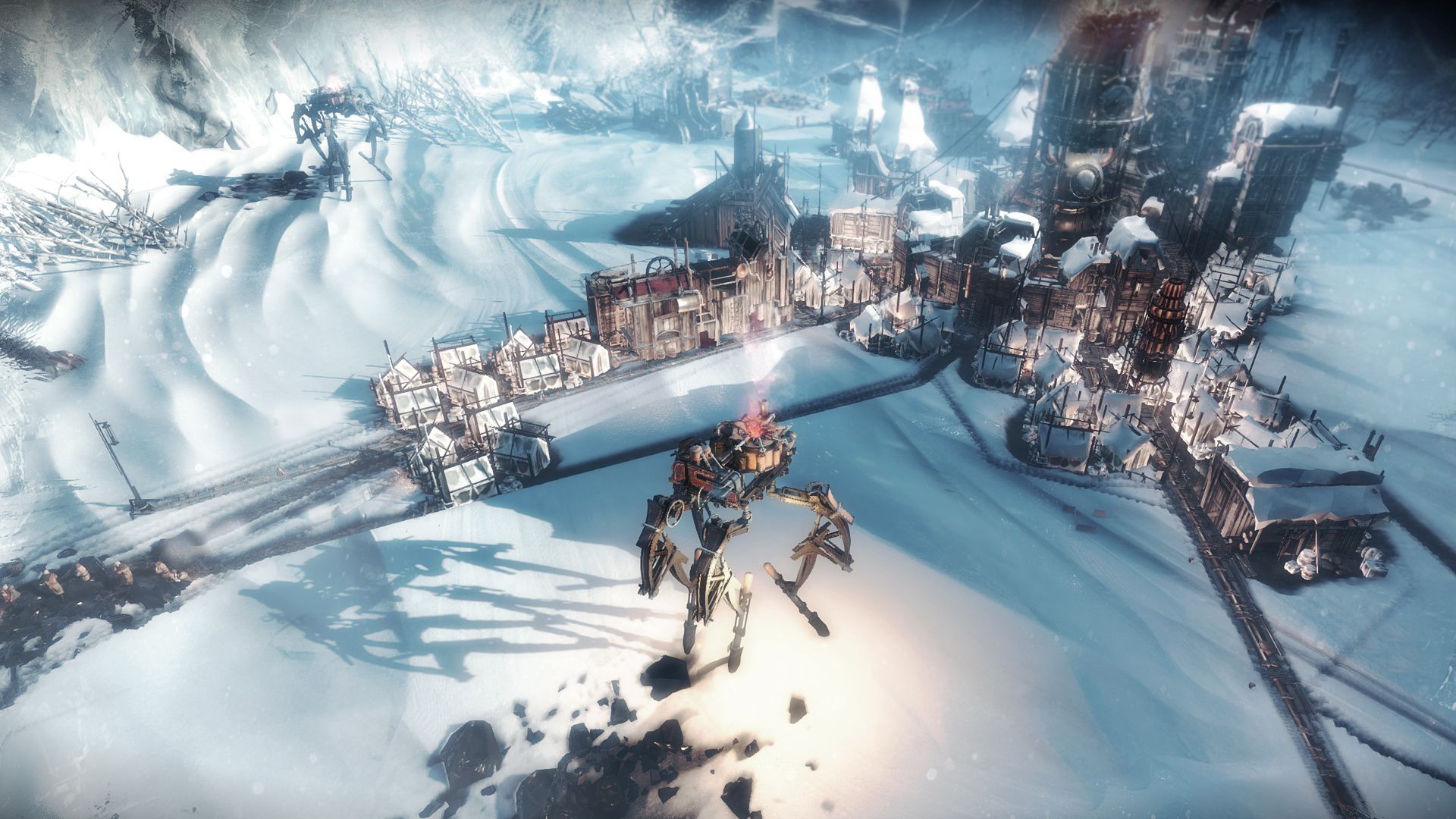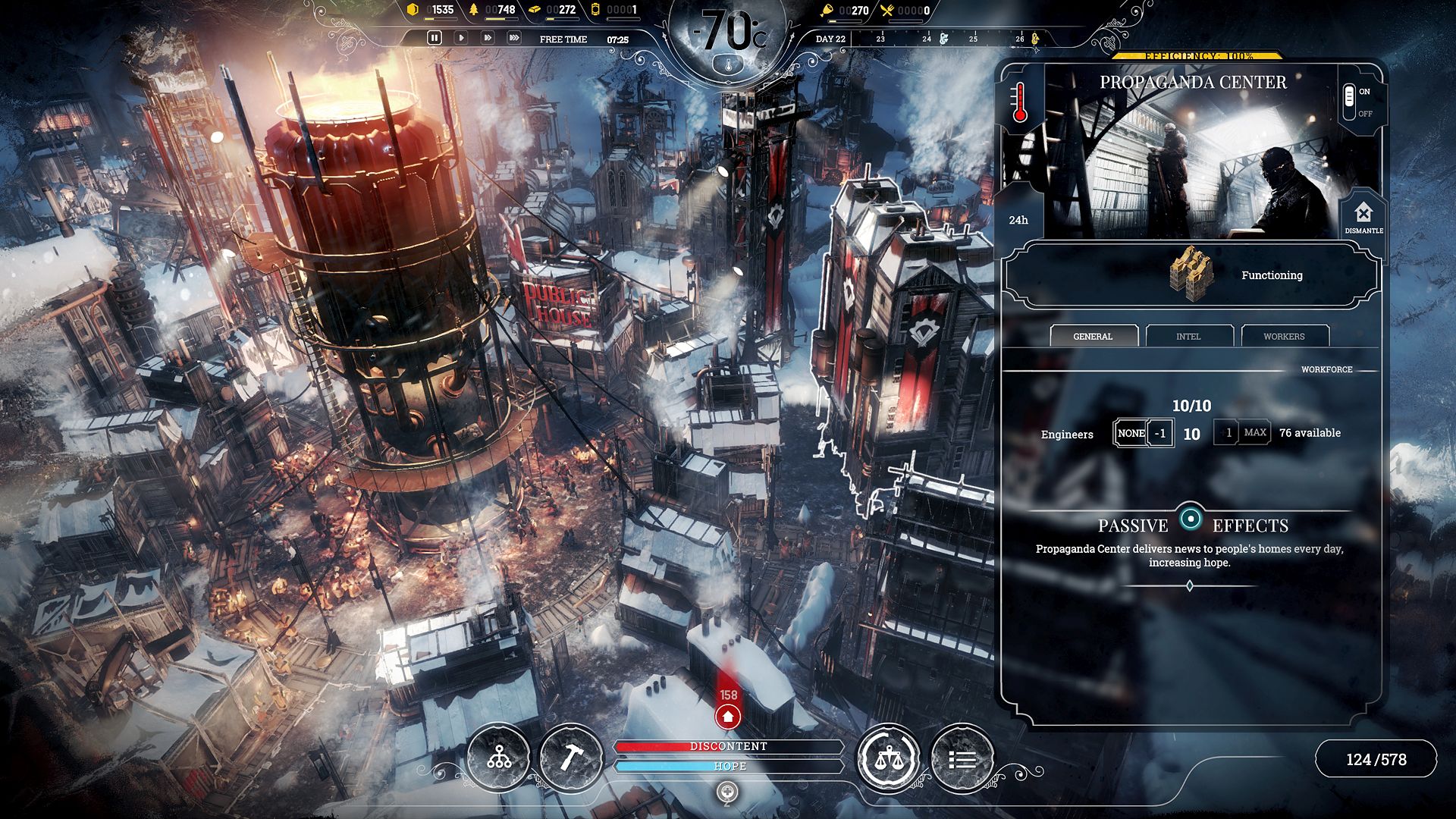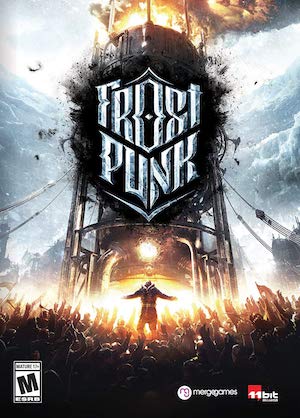
Humanity isn’t an easy puzzle to solve but suffering attracts all kinds of solutions. 11 Bit Studios always had a knack for understanding a person’s trials but city builder/survival title Frostpunk takes things a step further. It doesn’t just put the fate of a people in your hands – it challenges you to look them in the eye and tell them everything will be alright without 100 percent knowing yourself. As your citizens approach, their demands and ideas pushing you to shape this little slice of civilization, economic and moral sacrifices have to be made along the way. The question isn’t what kind of leader you’ll become but how to live with the decisions that brought you salvation.
"As your city begins to expand, streets must be built to connect buildings to the generator, otherwise they won’t receive ample heating to function."
It’s 1886 and a killer snowstorm has invaded the world. No one knows the cause but within a short time, Britain is blanketed with snow. In a last ditch effort, the dregs of the city band together with a steam engine to seek out an enormous generator. Your job as leader is to power the generator, provide shelter for the people and gather resources to keep the heat going. Fate is a cruel mistress though and it will only get colder as time goes by.
From a city-builder perspective, Frostpunk seems fairly streamlined. All buildings, whether they be tents, hunting outposts or workshops occupy a circular arrangement around the massive generator. To construct those buildings, you must send your people on foraging missions to gather supplies, leaving the generator’s warmth behind in the process. Things start off slow enough and Frostpunk cautiously guides one into crafting their post-apocalyptic home away from home, with initial short term goals to work out. Small notifications above the hot-bar indicate how many people are homeless and it doesn’t take long before they push for better – or in this case, basic – living standards. At the beginning, Frostpunk functions as a resource gathering mission as you allocate workers and engineers to various spots to gather coal, wood and steel before assigning them to kitchens and the like.
As your city begins to expand, streets must be built to connect buildings to the generator, otherwise they won’t receive ample heating to function. Structures like sawmills will be necessary when wood deposits and other resources go dry. The temperature will continue to drop though and this can cause sickness to spread among the people. If you research the right technologies, then small heaters among other things can be created to help.
It’s also possible to invest in other measures with the Book of Laws. Using this interface, one can enact measures that seem “practical” but take a heavy moral toll on the populace. For example, opt for treating the gravely sick in infirmaries for extended periods of time or simply amputate them to save resources. Children can be shielded from the harsh realities of the world in shelters or put to work, as they provide for the city just like everyone else. Laws have cooldown times so don’t expect to keep the entire population chugging along all day.
"Some citizens will suggest certain Laws, essentially offering their own “take” on how to improve society. Ultimately, it’s your decision to either act benevolent or take a harsher path and deal with the consequences."
The moral implications of your actions seem impactful enough – because at the end of the day, you ideally want to keep your people alive as opposed to limbless and childless – but there are two meters that help balance decisions. “Hope” reflects the positivity of people and how satisfied they are. This can be accrued through housing, food, proper medication and completing time-limited tasks. “Despair” goes the other way – push people to their utter limits, send their children to die and make survival a priority and their grievances will be reflected in this meter. But hey, productivity will go up and everyone gets to see a better tomorrow, probably. The other possibility is death from exhaustion. And when it comes to resources like engineers that are fairly limited, things can take a dire turn rather quickly.
What makes Frostpunk so immensely intriguing is how differing circumstances cause people to approach you. Various pop-ups during a playthrough will see citizens begging for aid. It could be something simple like searching for the missing members of your expedition by constructing a beacon or ensuring regular meals are provided. There’s no denying a certain lack of empathy, especially as the citizens hug the generator’s warm glow at night to fight off the cold.
Some citizens will suggest certain Laws, essentially offering their own “take” on how to improve society. Ultimately, it’s your decision to either act benevolent or take a harsher path and deal with the consequences. The best part is how your previous decisions can come back to haunt you. Amputees starting to pile up? Have you researched technology to help them? If not, then your citizens will start protesting. Productivity will also take a hit from the lack of workers. Too much Despair and the playthrough comes to an unceremonious end.
Managing all these different aspects, while ensuring workers aren’t wasting time on depleted resources and staying healthy, can be challenging. There’s plenty of micromanagement necessary when it comes to flipping shifts, pushing for overtime, assigning people to different tasks, keeping track of resource stores and building streets while everyone stays warm. For those who don’t know what they’re doing, Frostpunk can be fairly unforgiving, punishing missteps with more suffering as the playthrough wears on.
"Each playthrough feels like a do-or-die battle, one that will test your wits against the elements and – more dangerously – the fragile human psyche."
Success will see it open up even further though as you send scouts out into the world, discovering different outposts and eventually expanding your ramshackle establishment into a sprawling civilization. The steampunk aesthetic and heavy music coupled with the gorgeous environmental effects and immaculate artwork constitute a unique theme that’s oppressive but endearing. This is a tale of survival in the face of impossible odds. Sacrifice is a given but there could still be some beauty for those that live to talk about it.
Later on, due to extraneous circumstances, you can opt for two different paths to keep your citizens in line – Faith and Spiritual Strength or Order and Discipline, each offering its own unique Laws to enact and buildings to construct. After this, you can access two additional scenarios with The Arks and The Refugees which present unique challenges to the base experience. The Arks are more reliant on robots with a smaller number of human workers and must keep vital seeds protected against the cold. Meanwhile, The Refugees scenario has a number of different citizens entering your city who must be appropriately cared for. Disease, crowding and rapid resource depletion must all be managed while keeping your people together.
Oddly enough, Frostpunk does lack some essential features of a city-builder and survival game, like an endless/sandbox mode that lets you go for as long as possible. However, the base experience is already so amazing. Each playthrough feels like a do-or-die battle, one that will test your wits against the elements and – more dangerously – the fragile human psyche. Even if hardcore fans of the genre will find little else to hang on to after a dozen playthroughs, the sheer atmosphere and emotional triumph that Frostpunk offers stands above its competitors. This isn’t an experience that will just test your efficiency and mastery of its mechanics but your compassion (or lack thereof). Even if you’re prepared for a much, much longer ride, Frostpunk is a compelling tale of grit, failure and survival that must be experienced.
This game was reviewed on PC.
Wonderful aesthetic that strikes a great balance between bleak and historically relevant. Streamlined gameplay offers interesting challenges, from one's own people to the overall environment. Book of Laws adds more unique twists while two additional scenarios offer radically different objectives.
Lack of endless/sandbox mode hurts the replayability. Once you've played a few times and experienced everything, there's not much reason to return.




















